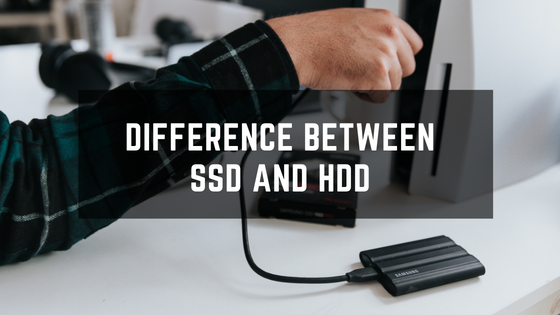We all know that computers need storage to save our files, but what many people don’t know is the difference between SSD and HDD storage. HDD, or hard disk drive, is the traditional format that has been used in computers for decades. SSD, or solid-state drive, is a newer technology that is starting to become more popular.
- So, what’s the difference? Here are some key points: –
- SSDs are faster than HDDs because they have no moving parts.
- This means that they can access data much more quickly than HDDs.
- SSDs are more expensive than HDDs because they are a newer technology. –
- HDDs are more reliable than SSDs because they have been around longer and have been tested more extensively. –
SSDs use less power than HDDs, which makes them better for laptops and other portable devices.
Now that you know the basics, it’s up to you to decide which type of storage is right for you. If you need speed and portability, go with an SSD. If you need reliability and cheaper prices, go with an HDD.
What is an SSD?
An SSD is a Solid State Drive, which is a type of storage device that contains no moving parts. This makes it different from the more common HDD, or Hard Disk Drive, which relies on spinning disks to store data.
The main advantage of an SSD over an HDD is that it is much faster. Because there are no moving parts, data can be accessed much more quickly. This can make a big difference when booting up your computer or opening programs.
Another benefit of SSDs is that they are more durable. Because there are no moving parts, they are less likely to be damaged if dropped or knocked around. This makes them ideal for use in laptops and other portable devices.
If you’re looking for a new storage device, then you’ll need to decide whether an SSD or HDD is right for you. If speed and durability are your main concerns, then an SSD is the better choice. However, if you’re looking for large-capacity storage, then an HDD might be a better option.
What is an HDD?
“Hard disk drive” (HDD) is a data storage device that uses spinning disks to store and retrieve digital information. It is one of the most common types of storage devices, as it offers a high capacity at a relatively low cost. HDDs are used in a variety of applications, including desktop computers, laptops, servers, and workstations.
An HDD consists of one or more spinning disks, also called platters, that are coated with a magnetic material. The disks are mounted on a spindle that spins at high speed. Data is written to and read from the disk by an arm with a read/write head that moves across the surface of the disk. As the disk spins, the head moves to the appropriate track and then reads or writes the data.
HDDs typically have much higher capacities than SSDs. For example, you can find HDDs with capacities up to 10TB (terabytes), while SSDs top out at around 4TB. This means that HDDs are better suited for storing large amounts of data, such as video files or database backups. However, HDDs tend to be slower than SSDs when it comes to accessing data stored on them.
The Difference between SSD and HDD
SSD vs HDD: Which is best for your PC?
With the ever-increasing price of solid-state drives (SSDs), many people are wondering if they should make the switch from their current hard disk drive (HDD). Here, we’ll discuss the key differences between SSDs and HDDs to help you make an informed decision about which is best for your needs.
Performance
One of the biggest advantages of SSDs over HDDs is performance. Because SSDs have no moving parts, they can access data much faster than HDDs. This means that your computer will boot up faster, apps will open more quickly, and files will transfer faster. If speed is a priority for you, then an SSD is a better choice.
Reliability
Another advantage of SSDs over HDDs is reliability. Because there are no moving parts in an SSD, there’s less chance of something going wrong. This means that your data is less likely to be corrupted and your drive is less likely to fail. If you need to store important data that you can’t afford to lose, then an SSD is a better choice.
Capacity
One downside of SSDs compared to HDDs is capacity. Currently, most SSDs on the market have lower capacities than HDDs. This means that if you need to store a lot of data, you may need multiple SSDs or you may need to supplement your SSD with an HDD. However, as SSD technology improves, we’re seeing SSDs with higher capacities being released.
Cost
The final consideration is cost. SSDs are more expensive than HDDs, so you’ll need to factor that into your decision. However, the price difference has been decreasing over time, and as SSD capacities increase, the price difference is likely to continue to decrease.
Which one should you buy?
There are a few key differences between SSDs and HDDs that you should keep in mind when deciding which one to buy.
First, SSDs are much faster than HDDs. They can boot up your computer in seconds, whereas an HDD can take minutes. They also load programs and files much quicker. This is because SSDs have no moving parts, so data can be accessed much faster.
Second, SSDs are more expensive than HDDs. This is because they are newer technology and thus haven’t been mass produced as much as HDDs have.
Third, SSDs are more fragile than HDDs. Because they have no moving parts, they are less likely to be damaged if dropped or knocked around. However, they are more susceptible to data loss if power is cut off suddenly (e.g., during a power outage).
Finally, SSDs typically come in smaller capacities than HDDs. This is because they are more expensive per gigabyte and thus aren’t practical for storing large amounts of data.
So which one should you buy? If you need speed and don’t mind spending a bit extra, go for an SSD. If you’re on a budget or need to store lots of data, an HDD is the better choice.
Conclusion
We hope that this article has helped you understand the difference between SSD and HDD. While both have their own advantages and disadvantages, it is important to choose the right type of storage for your needs. If you need a high-performance storage device, then an SSD is the way to go. However, if you are looking for a cheaper option with more storage space, then an HDD is a good choice.



